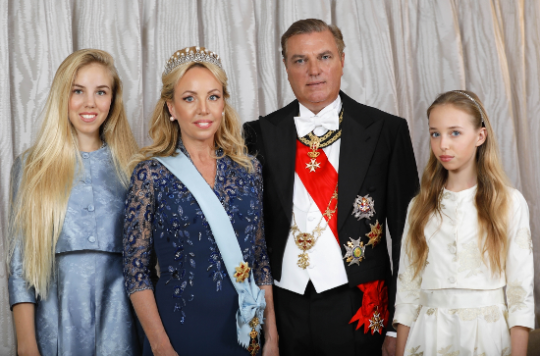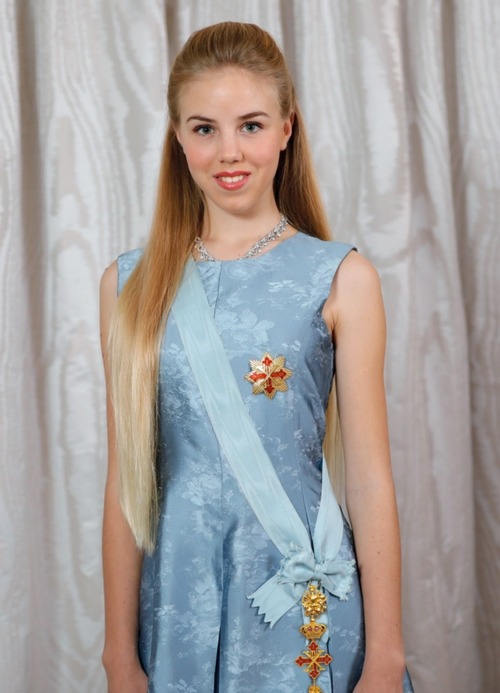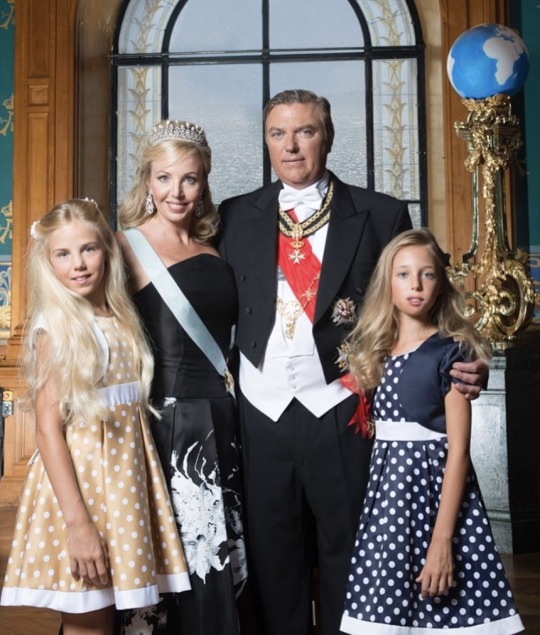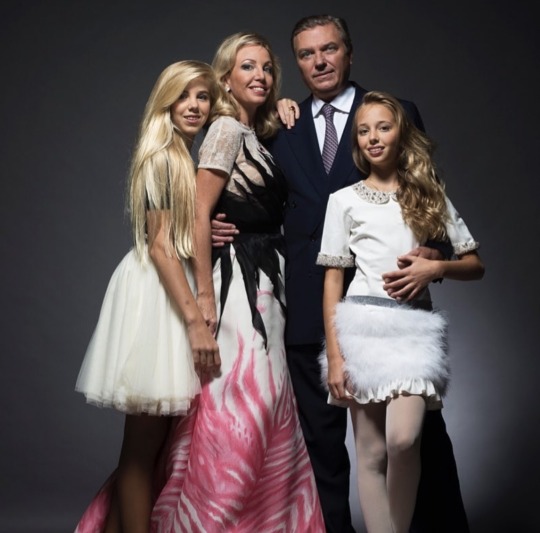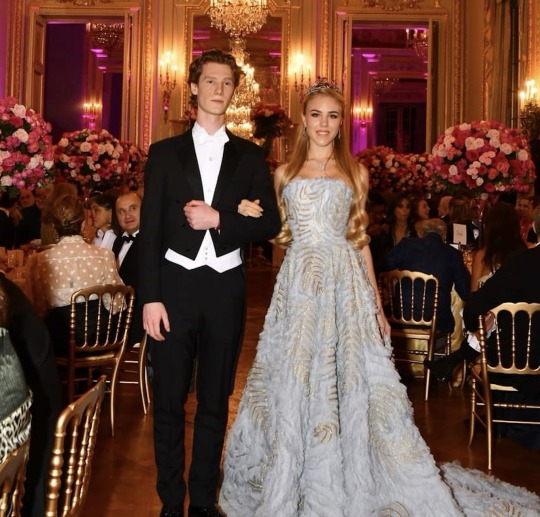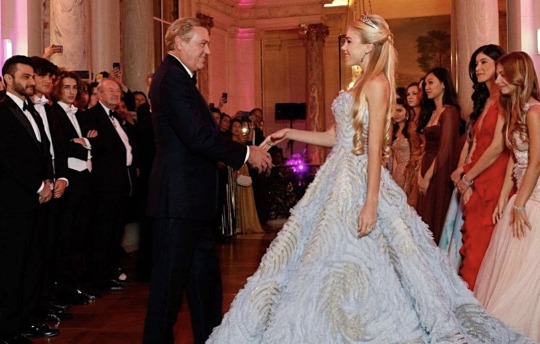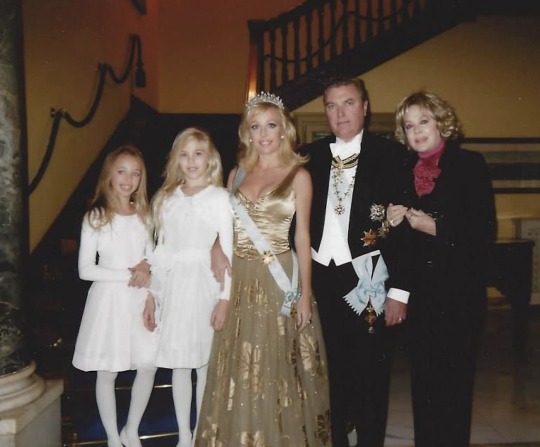#Maria-Carolina of Bourbon-Two Sicilies
Text


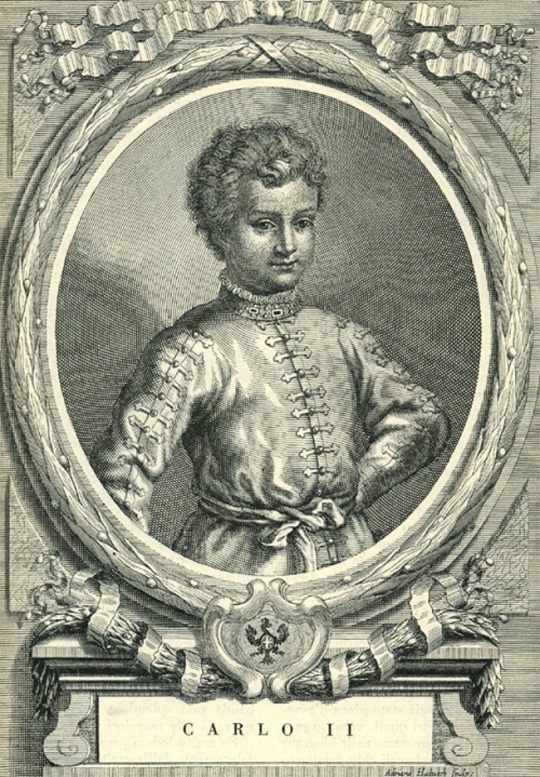
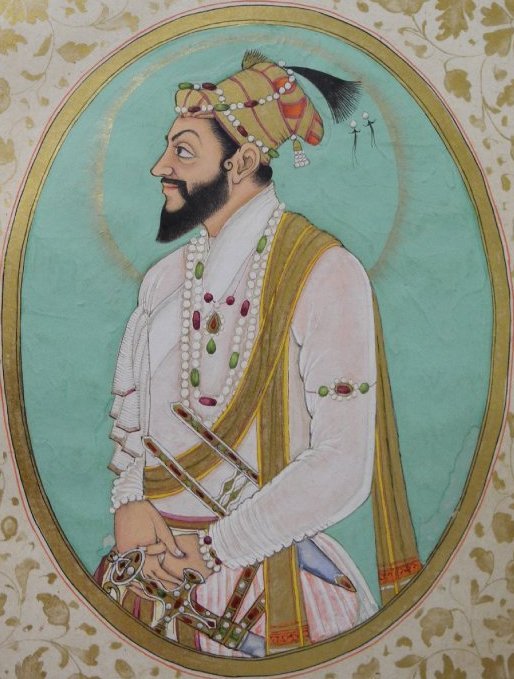
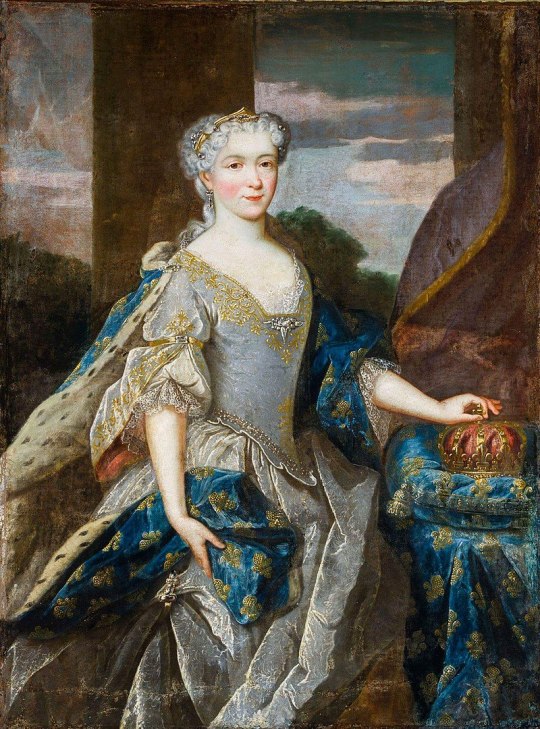
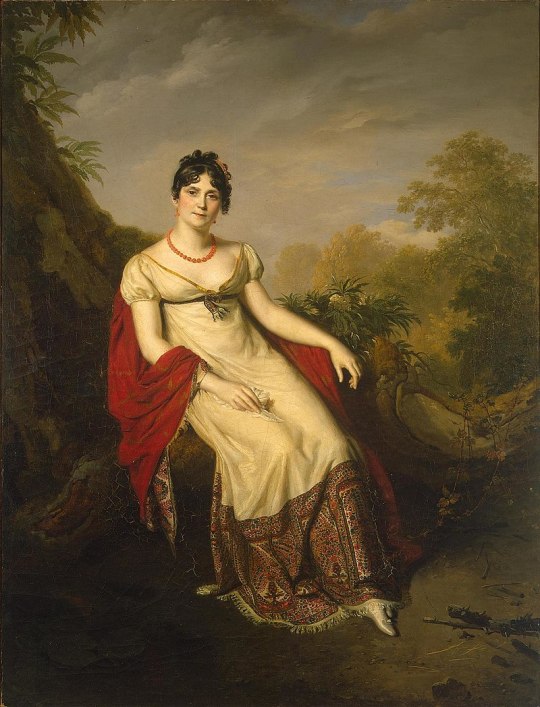
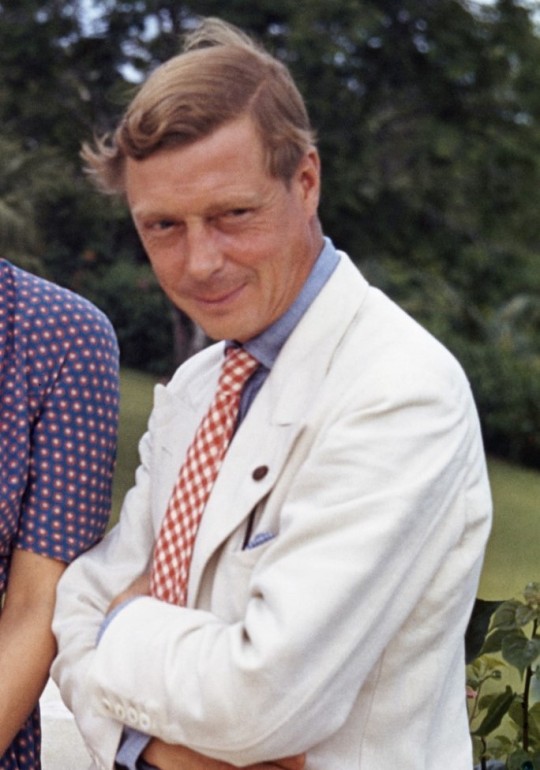



Royal Birthdays for today, June 23rd:
Ptolemy XV Philopator Philometor Caesar, Pharaoh of Egypt, 47 B.C.
Margaret of Denmark, Queen of Scotland, 1456
Charles II, Duke of Savoy, 1489
Shah Shuja, Mughal Prince, 1616
Marie Leszczyńska, Queen of France, 1703
Joséphine de Beauharnais, Empress of the French, 1763
Edward VIII, King of the United Kingdom, 1894
Tribhuhvan Bir Bikram Shah, King of Nepal, 1906
Maria Carolina of Bourbon-Parma, Marchioness of Sala, 1974
Maria-Carolina of Bourbon-Two Sicilies, Duchess of Palermo, 2003
#caesarion#marie leszczynska#josephine de beauharnais#margaret of denmark#Maria-Carolina of Bourbon-Two Sicilies#Maria Carolina of Bourbon-Parma#edward viii#shah shuja#charles ii#Tribhuhvan Bir Bikram Shah#royal birthdays#long live the queue
15 notes
·
View notes
Note
What the tea on Maria Carolina? You said in one of your posts: “Maria Carolina truthers know she's the most interesting daughter and the one there should be hundreds of books and movies about, but the general audiences haven't seen the light yet.” I’m intrigued
Hi! Sorry it took me so long; I was reading a book about the Bourbons in Naples and I wanted to finish it to be able to give a more complete answer… but it ended up taking me MONTHS to be done with it.
This answer was a bit difficult to put together because Maria Carolina’s life was very eventful, so I’ll just mention some facts about her life, focusing more on the Napoleonic era and Napoleon specifically because I think you’ll be more interested in that. Also please feel free to correct me If I got something wrong, since this is a time period I’ve only started to learn about recently. So what was the tea?
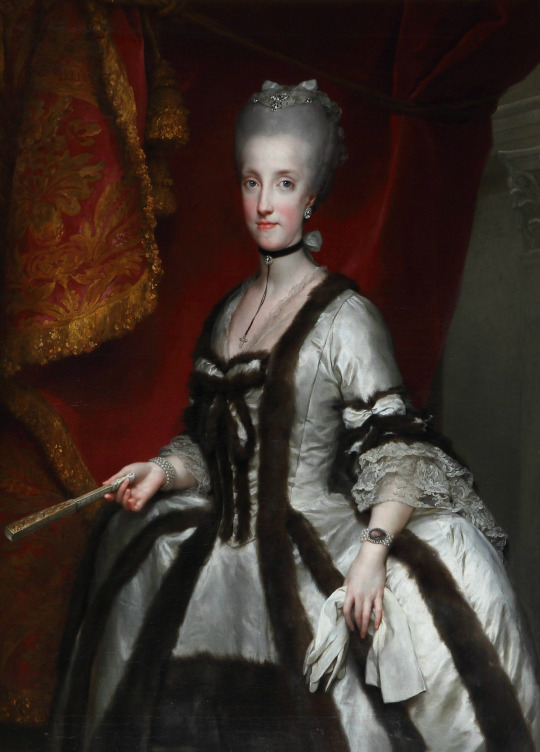
Born in 1752 Maria Carolina was the thirteenth child of Empress Maria Theresia and Franz I, Holy Roman Emperor. As part of her mother’s policies of rapprochement to the Bourbons, she and her siblings were engaged to different members of the houses of Spain, France, Parma and Naples. Maria Carolina was promised to the Dauphin of France, but when her elder sister, promised to the King of Naples, died of smallpox, she took her place.
Ferdinando of Naples had been a child king, and he remained so for the rest of his life. His only diversions were hunting and pulling pranks on his courtiers, and he had a terrible reputation across the courts of Europe as an uneducated, bad mannered, spoiled man, kept in ignorance by his Ministers so they could control him. Everyone pitied the young Archduchess’ fate, her mother Maria Theresia wrote around the time of Maria Carolina’s wedding that she “trembled in fear for her”. But duty came first, and so she went to Naples, aged only sixteen.
Maria Carolina did not had it easy at first. She was terribly homesick and found herself in a court that could not have been more different to the one she grew up in. When her sister Maria Antonia married the Dauphin of France, she wrote to her former aya:
When I imagine that her fate will perhaps be the same as mine, I want to write volumes to her on the subject, and I very much hope that she has someone like me [to advise her] at the beginning. If not, to be frank, she may succumb to despair. One suffers real martyrdom, which is all the greater because one must pretend outwardly to be happy. I know what it is like, and I pity those who have yet to face it… I would rather die than endure again what I went through at the beginning. Now all is well, which is why I can say—and this is no exaggeration—that if my faith had not told me, ‘Set your mind on God,’ I would have killed myself.
Unsurprisingly Maria Carolina didn’t fall head over heels for her husband, but she did convince him that she had, and eventually won his affection. After she bore a son in 1775 she earned a seat in the State Council (as her marriage contract established), and from that point onward she became an active player in Neapolitan politics. One of her firsts moves was to remove the Secretary of State, Marchese Tanucci, who had been Regent during her husband’s minority and still held a huge influence over him.
After Tanucci’s dismissal she became the person with the most influence over Ferdinando, and she pretty much had him wrapped around her finger for most of their marriage, acting as the de facto ruler of Naples. Every decision the king took was only after consulting his wife, and she often had the final say. However, this didn’t meant Maria Carolina held absolute power: Ferdinando was still a very unpredictable person, and as soon as his wife was out of his favor he stopped listening to her.
Maria Carolina was enthusiastic about the ideas of the Enlightenment, as many other royals were at first, and even protected and encouraged the Masons in Naples during her early years as queen. But she was still the consort of an absolute monarch that believed they were chosen by God to rule, so it shouldn’t come as a surprise that she was horrified by the French Revolution and fervently opposed it. If it were for her, she would've declared war on France immediately, but this was not possible. On the execution of her brother-in-law Louis XVI she wrote:
Knowing your upright mind, I can imagine your emotion on hearing of the appalling crime perpetrated against the unfortunate King of France in all solemnity, tranquillity and illegality (…) He was the head of our family, our kinsman, cousin and brother-in-law. What an atrocious example! What an execrable nation! I know nothing about the other wretched victims in the Temple. If sorrow does not kill them, other horrors may be expected from this horde of assassins. I hope that the ashes of this good Prince, of this too good Prince who has suffered shame and infamy for four years culminating in execution, will implore a striking and visible vengeance from divine Justice, and that on this account the Powers of Europe will have no more than a single united will, since it is a matter in which they are all involved.
She was growing increasingly anxious about her sister, Queen Marie Antoinette, and her hatred for France became an obsession:
I hear horrible details from that infernal Paris. At every moment, at every noise and cry, every time they enter her room, my unfortunate sister kneels, prays and prepares for death. The inhuman brutes that surround her amuse themselves in this manner: day and night they bellow on purpose to terrorize her and make her fear death a thousand times. Death is what one may wish for the poor soul, and it is what I pray God to send her that she may cease to suffer. . . . I should like this infamous nation to be cut to pieces, annihilated, dishonoured, reduced to nothing for at least fifty years. I hope that divine chastisement will fall visibly on France, destroyed by the glorious arms of Austria.
At this point she had lost all hopes of her being rescued, and wished her “a natural death as the best thing that could happen to her”. But even though she had been waiting for it, the news of Marie Antoinette’s execution still shocked her. She wept and prayed with her children for “her wretched sister”.
Naples fell into a social crisis during these years, paranoia, fear and suspicion of the revolution in every corner. There was an active persecution of everyone thought to be a “jacobin”, arrests, trials and executions. But the country couldn’t wage war against France, and eventually they had to sign a peace treaty, which the Queen disapproved: “I am not and never shall be on good terms with the French… I shall always regard them as the murderers of my sister and the royal family”.
It was also during this time that the star of a certain Bonaparte started to rise, and Maria Carolina followed his career with interest and admiration. Before the treaty of Campo Fornio in October 17, 1797, she wrote about Napoleon:
I admire him, and my sole regret is that he serves so detestable cause. I should like the fall of the Republic, but the preservation of Bonaparte. For he is really a great man; and when one can only see ministries and sovereigns with petty and narrow views, one is all the more pleased and astonished to watch such a man rise and increase in power, while deploring that his grandeur is attached to so infernal a cause. This may seem strange to you. But while I loathe his operations, I admire the man. I hope that his plans will miscarry and his enterprises fail; at the same time I wish for his personal happiness and glory so long as it is not at our expense… If he dies they should reduce him to powder and give a dose of it to each ruling sovereign, and two to each of their ministers, then things would go better.
Soon she would have less nicer things to say about Naps, but she never lost that original admiration and astonishment.
In 1798 Ferdinando, encouraged by his wife and the British, led a expedition in December to try to expel the French from Rome. Not only the Neapolitan troops weren’t prepared to defeat the French Army, they were also technically still at peace with France, so this wasn’t a good move at all, and only two days after entering Rome Ferdinando had to retreat. Expectedly, Napoleon’s reaction to such a break of peace was marching over Naples. The royal family had to flee to Sicily, a tragic journey in which Maria Carolina’s six-years-old son Alberto died after a series of convulsions.
This ask is already too long to unpack all the political mess around the short-lived Parthenopean Republic, so to summ it up: it didn’t work out, and by 1799 the Bourbons were back in power. They were unforgiving of the republicans: during the following months there were thousands of arrest and hundreds of executions and deportations. Maria Carolina felt no mercy for them: “Death for the ringleaders, deportation for the rest... Our country must be purged of this infection”.
The Queen returned to Naples in August 1802, after more than three years of absence. She had never been a liked queen, but her unpopularity reached a new low since she was blamed for all the misfortunes of the last years. Having lost the influence she had on her husband, who held her responsible for the Rome expedition fiasco, she meddled a little less in politics now, dedicating mainly to her children and grandchildren, particularly to her unmarried daughters.
Speaking of her children, she had seventeen (!!!) but she would outlive fourteen of them. Part of her masterplan for them was to marry them all to her Habsburg nephews and nieces, and in many cases she succeeded. Just to name one exemple her eldest daughter Maria Theresa married Emperor Franz II/I of Austria. Maria Carolina’s relationship with this son-in-law ended up being a bit tense, since Franz found her mostly meddlesome and never aligned with her plans. On top of that, she was quite hurt when Franz remarried only months after her daughter’s death; after he announced his engagement she stopped adressing him as her son and resorted only to “Your Majesty” instead.
In 1804 Napoleon became Emperor, and we have a letter she wrote to Minister Gallo on this. Buckle up because whatever you imagine her reaction was, you aren’t ready for it:
It was not worth the trouble to condemn and slaughter the best of kings [Louis XVI], dishonour and revile a woman, a daughter of Maria Theresa, a holy princess [Marie Antoinette], to wallow in massacres, shootings, drownings, and kill six hundred prelates in a church, perpetrating horrors of the most barbarous ages at home and abroad, writing whole libraries on liberty, happiness, etc., and at the end of fourteen years become the abject slaves of a little Corsican whom an incredible fortune enabled to exploit all means to succeed, marrying without honour or decency the cast-off strumpet of whom the murderer Barras was surfeited, Turkish or Mohammedan in Egypt, atheist at the start, dragging the Pope after him and letting him die in prison, a devout Catholic after that, practising every deceit, shortening the lives and normal careers of sovereigns who might assert themselves, only allowing the dummies to vegetate, then atrociously, without a shadow of justice, assassinating the Duc d'Enghien, plotting himself (and he did not blush to admit it, so blinded is he by passion) a conspiracy to victimize the rulers he still feared, and on top of all these abominations he is acclaimed as Emperor: he and his race of Corsican bastards are to dominate almost half Europe, yet every thinking person is not revolted. Far from it, their egoism and weakness are such that they study how low they can prostrate themselves before the new idol… Send me word of the august Emperor’s intentions regarding Italy: whether he will deign to accept us as his slaves or will leave us in our obscurity… Tell me what the other Powers are saying. I imagine a Gloria in Excelsis Demonio will be the general refrain…
She took it pretty well right?
The future of the Bourbons of Naples once again seemed bleak, and this time Maria Carolina resorted to directly appealing to Napoleon. This was the beginning of a very passive-agressive epistolary relationship, both of them trying to be civil but still borderline insulting each other. I honestly find this funny, because you have Maria Carolina swearing to Napoleon that she had nothing against him or France and then she would write this to one of her ministers: “You will never imagine the rage and despair which the extremely insolent screed of the scoundrelly but too lucky Corsican has caused me.”
Despite the passive-agressiveness, when Napoleon was looking for a princess bride for his stepson Eugène he actually considered one of Maria Carolina’s daughters, Maria Amelia, as a possible candidate. But when the Minister of Foreign Affairs Gallo told Maria Carolina of Napoleon’s inquiries about her daughter she was so utterly horrified at the idea of marrying into the Corsican’s family that the project was immediately dropped (eventually Maria Amelia would go on to marry the Duke of Orléans, later King Louis Philippe I, and became the last queen of the French).
After Austerlitz Napoleon pretty much had all of Europe eating from his hand, and the Neapolitan sovereigns felt abandoned by every other power. Maria Carolina tried one last futil attempt to plead to Napoleon, but he had already decided to take Naples. The King was the first to Sicily flee this time, the Queen stayed behind and tried to organize a resistance, but eventually she realized there was nothing they could and also fled with her daughters. Before sailing she wrote to her daughter Empress Maria Theresa of Austria: “I fear we shall never see Naples again”. She was right.
The royal couple spent their second exile the same way they spent their first: Ferdinando living his best life enjoying the freedom he had in Sicily and Maria Carolina being utterly miserable. Her health worsened and she often was in pain, but recovering Naples from the Bonapartes became her obsession. She was the leading force behind every attempt to get the kingdom back, but soon she started to crash with their only allies left, the British. They wanted to keep the Bourbons in Sicily, getting back Naples was not a priority for them.
So remember Maria Carolina’s her reaction when Napoleon suggested to marry her daughter to Eugène? Well she didn’t took her granddaughter’s marriage to Napoleon himself any better: “Only this calamity was held in reserve. To become the Devil’s grandmother”.
But at the end, the final boss in Maria Carolina’s life wasn’t Napoleon, but the British. The Queen was too meddlesome and hindered their plans, and made a personal enemy of the British representative Lord Bentinck. Maria Carolina was accused of conspiring and being a threat to Sicily, and eventually the King was forced by the British to send her away. Exiled in exile, having nowhere else to go, she returned to Vienna in an eight-months-journey. While her son-in-law had no desire to receive her, he couldn’t turned her away either. She got in a better mood once she was once back at her childhood home, spending time with her Austrian grandchildren. It was there that she heard of the French defeats and Napoleon’s abdication.
Even though Maria Carolina made her hatred of Napoleon her personality for fifteen years she felt sympathetic towards him after he was defeated, reproached Marie Louise for not going to Elba with her husband, and told her that if she wasn’t allowed to reunite with him she should tie her bed-sheets to her window and escape, because marriage was for life. She also showed a lot of interest in her great-grandson, little Napoleon II, whom she called “mon petit monsieur”; in a letter to Marie Louise she described him as “very charming, quiet and well behaved” and told her that “may God give you in him every consolation a mother can receive.”
Maria Carolina was not to see the Bourbons restored in Naples. She died of a stroke in September 8, 1814, aged sixty-two-years old. At the time of her death Murat was still King of Naples, and the allies were happy to leave Ferdinando in Sicily. She was buried in the Capuchin Crypt, her death being only a small incident in the Congress of Vienna’s dance.
Overall, I personally find Maria Carolina the most fascinating because of everything she represented: she was a healthy daughter of the ancien régime that saw how the world as she knew it crumbled down and changed forever, to the point that by the time of her death she, the last surviving child of Maria Theresia, was a living relique (and she wasn’t even that old - a testament of how fast everything had changed). And she didn't got there sitting by idly: she fought against this new world every step of the way, made it out alive, but lost the battle still. And I don't know about you, but to me this is just a more interesting story to tell than Unoriginal Marie Antoinette Adaptation Number 7383.
Sources:
Acton, Harold (1998). The Bourbons of Naples (1734-1825)
Castelot, André (1974). King of Rome; a biography of Napoleon's tragic son
Stollberg-Rilinger, Barbara (2020). Maria Theresa: The Habsburg Empress in her Time
#sorry if this answer is too long and messy - i been putting it together little by little for the past month#but this is only the top of the iceberg i left out so many things#queen maria carolina of naples#ferdinando i of the two sicilies#house of habsburg#house of bourbon-two sicilies#napoleon i#cw suicide mention#asks
53 notes
·
View notes
Text



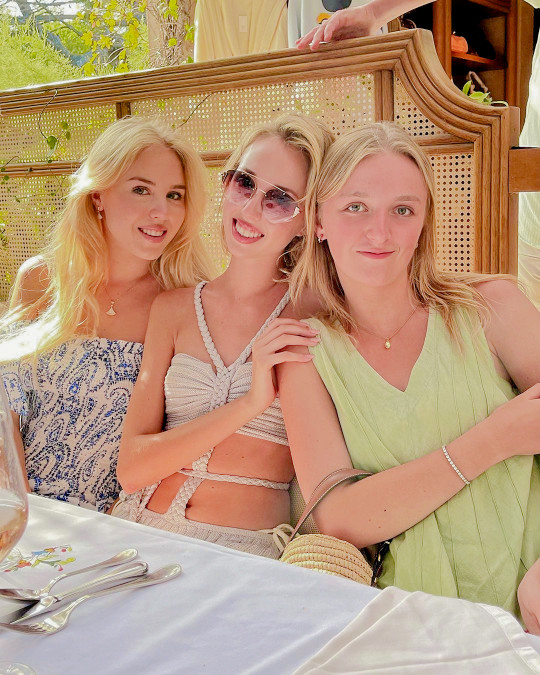
Princess Camilla of Bourbon Two Sicilies and Princess Maria Carolina of Bourbon Two Sicilies shared those pictures on their Instagram page, of themselves with Prince Carlo of Bourbon Two Sicilies, Princess Maria Chiara of Bourbon Two Sicilies, Prince Laurent of Belgium, Princess Claire of Belgium, Princess Louise of Belgium, Prince Nicolas of Belgium and Prince Aymeric of Belgium, during their summer holidays in Saint-Tropez, France -August 14th 2023.
📷 : Princess Camilla of Bourbon Two Sicilies and Princess Maria Carolina of Bourbon Two Sicilies on Instagram.
#prince charles#prince charles of bourbon two sicilies#princess camilla#princess maria carolina#princess maria chiara#royal family of bourbon two sicilies#bourbon two sicilies#prince laurent#princess claire#princess claire of belgium#princess louise#prince nicolas#prince nicolas of belgium#prince aymeric#belgian royal family#belgium#2023#august 2023#saint tropez#france#france 2023#summer holidays#summer holidays 2023#royal children#my edit
12 notes
·
View notes
Text

Princess Maria Carolina and Princess Maria Chiara of Bourbon-Two Sicilies || Alberta Feretti
#Princess Maria Carolina#Princess Maria Chiara#Princess Maria Carolina of Bourbon Two Sicilies#Princess Maria Chiara of Bourbon Two Sicilies#Alberta Ferretti#gown#strapless
9 notes
·
View notes
Text
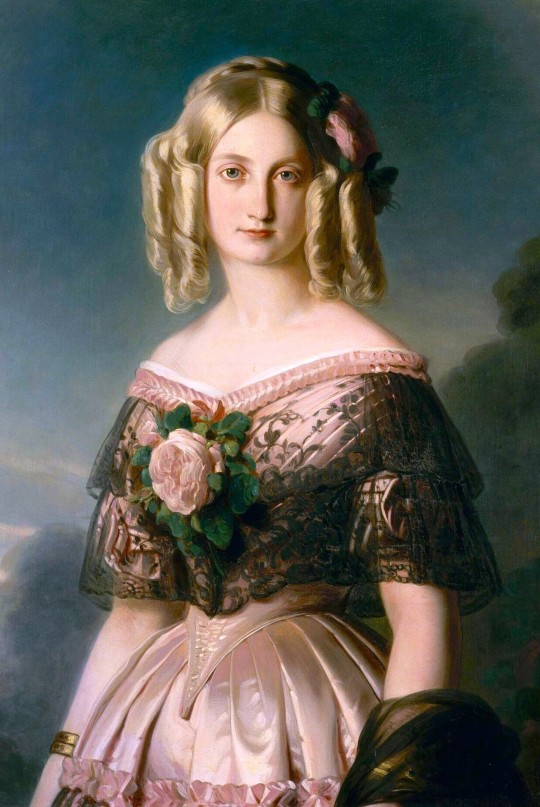
Princess Maria Carolina of Bourbon-Two Sicilies (1846)
by Franz-Xaver Winterhalter
3 notes
·
View notes
Text

Prince Christian attends the qualifying session for the F1 Monaco Grand Prix in Monte Carlo joined by Princess Maria Carolina and Princess Maria Chiara of Bourbon Two Sicilies | May 27th, 2023
59 notes
·
View notes
Text
Due to @charlotte-of-wales posts about Prince Michael of Kent in St. Tropez, I once again fell down the rabbit hole of "wait what exactly is it those two men are arguing about again in regards to the House of Bourbon-Two Sicilies?" (I fall down this rabbit hole basically every single time the Duke & Duchess of Castro & their children pop up on my radar, which is more often than I like because unfortunately, they are good at Instagram)
So let's bring it back to 1934, Prince Ferdinand Pius become head of the House & pretender to the throne (since the Kingdom of the Two Sicilies doesn't exist). He had six children and one of them was a son, unfortunately, that son died already in 1914. This means that when Prince Ferdinand Pius died in 1960, we had a succession crisis because he had no male descendants. I'm just gonna quote Wikipedia here:
Ferdinand Pius had seven younger brothers. At the time of Ferdinand Pius's death in 1960, the oldest brother, Carlos was deceased but had left descendants. The next surviving brother was Ranieri (Duke of Castro). By the rule of primogeniture, headship would normally pass through Carlos to his son Alfonso (Duke of Calabria).
Ranieri contested Alfonso's claim arguing that Carlos had renounced any claim to the Two Sicilies succession on the part of himself and his heirs when he executed the Act of Cannes in 1900 in anticipation of his marriage the next year to Mercedes, Princess of Asturias, heiress presumptive to the Spanish throne.
Alfonso offered a different interpretation of the Act of Cannes, describing it as effective only if Carlos should succeed to the Spanish throne. He also took the position that the Act of Cannes was invalid under the succession rules of the House of Two Sicilies itself since these laws provided only one, specific reason for a renunciation and that was in the event of the Spanish and Two Sicilies crowns being united in one person - which has not happened since 1759.
Despite an investigation by five of the highest institutions of the Spanish state having concluded unanimously that the legitimate claimant was the late Carlos, Duke of Calabria, the junior line (the Castrian line) continues to perpetuate its claim
I know, I know, one shouldn't just take what Wikipedia says as truth but they're using this book as a source. Feel free to read it & fact-check me if you want & have the energy to.
Now fast forward to today, we have the two claimants: Prince Pedro, Duke of Calabria; and Prince Carlo, Duke of Castro. Prince Pedro has seven children, the oldest being Prince Jaime, Duke of Noto, who you might remember from his wedding to Lady Charlotte in Sep. 2021. Prince Carlo has two daughters, Princess Maria Carolina (apparently she's Duchess of Calabria and Palermo) and Princess Maria Chiara (who apparently is Duchess of Noto and Capri). So as you can see, we don't just have a fight regarding the headship... we also have a fight regarding the Calabria & Noto titles!
This all leads us to the next part of this juicy ridiculous stupid drama. Take it away Wikipedia:
At the Holy Mass in Saint Peter's Basilica celebrated in Rome on 14 May 2016, during a Pilgrimage by members of the Constantinian Order awarded by Prince Carlo to Rome and Vatican City, Prince Carlo made public his decision to change the rules of succession. He claimed that this change was so the rules of succession would be (as he claimed) compatible with international and European law, prohibiting any discrimination between men and women. The rule of absolute primogeniture would henceforth apply to his direct descendants, his elder daughter being named by him as heiress apparent.
Prince Pedro publicly objected that Prince Carlo's declaration violated the terms of their reconciliation agreement, to which Carlo replied that further "destabilisation" could lead to the termination of the 2014 pact. Since the succession rules had been settled in two international treaties, enforced in the Pragmatic Decree of 1759 and incorporated into the laws of the kingdom, it was beyond the powers of any claimant to the headship of the royal house to change the succession. Furthermore, it was in outright breach of the solemn agreement made in Naples in 2014 by which Prince Carlo recognised the late Infante Carlos as "Duke of Calabria", his son Prince Pedro as "Duke of Noto" and the latter's son, Prince Jaime, as "Duke of Capua".
Saga's conclusion: Basically everyone apart from Carlo agrees that Pedro, his ancestors & his son Jaime are the ones who have the right to the defunct throne. Unfortunately, they have a distant relative who can't shut up who has everyone on Instagram convinced, much because of his wife and his daughters, that they are the ones who have the right to the throne. Now, I don't think anyone argues against that Carlo, his wife and his daughter are part of the House, it's just like... Imagine if Edward & Sophie one day just start blasting out on social media & traditional media as well that they are the King & Queen with Lady Louise as the Princess of Wales. I mean, I think all of us would side-eye them & be like "hun, please sit down & stop talking, you are embarrassing yourself"
#royal watching#royal ramblings#house of bourbon two sicilies#it's so stupid the whole thing#he even freaking signed official papers saying he recognise that those titles belong to carlos pedro and jaime#what does he even get out of all of this?!
32 notes
·
View notes
Text
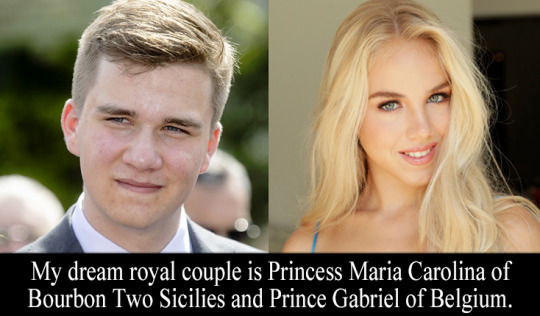
“My dream royal couple is Princess Maria Carolina of Bourbon Two Sicilies and Prince Gabriel of Belgium.” - Submitted by Anonymous
4 notes
·
View notes
Note
Marcia Chiara and Maria Carolina of Bourbon-Two Sicilies have stated a couple of times that they personally know Leonor and Sofia. When could that have happened? Like I can't think of a place
Juan Carlos also supported his cousin Carlos (now dead) and Carlo, the current Duke of Castro, wasnt invited to Felipe's wedding which I would guess is a big slight. I think they were lying.
Are these the girls that @charlotte-of-wales posted about? One of which is supposedly dating Christian?
Honestly I cannot tell you anything about this lol. The Bourbon-Two Sicilies is a branch of the Bourbon-Anjou House, which is Felipe, Letizia, Leonor, Sofía, etc. I mean it’s always a possibility that they know each other because nobody knows what the family does privately (or at least from what I know that involves the girls).
I doubt we will ever see them in public together because of how the girls’ seem to be seen as royal influencers rather than actual royalty (similar to how other royals are starting to become if they’re not heirs), and it’ll make the family look tacky in my opinion. But yeah I don’t know! Not trying to say the girls are liars but maybe they mean that they know Leonor & Sofía, but aren’t like… close lol because that very well could be the case!
#asks#maybe they’re just trying to show they have active royal connections#rather than just saying we r descendants from the reigning royal house#does this make sense?
6 notes
·
View notes
Text

Maria-Carolina of Bourbon-Two Sicilies, Duchess of Palermo.
#casa di borbone#borbone delle due sicilie#borbone di napoli#regno delle due sicilie#regno di napoli#princess maria carolina#full length portrait
5 notes
·
View notes
Text
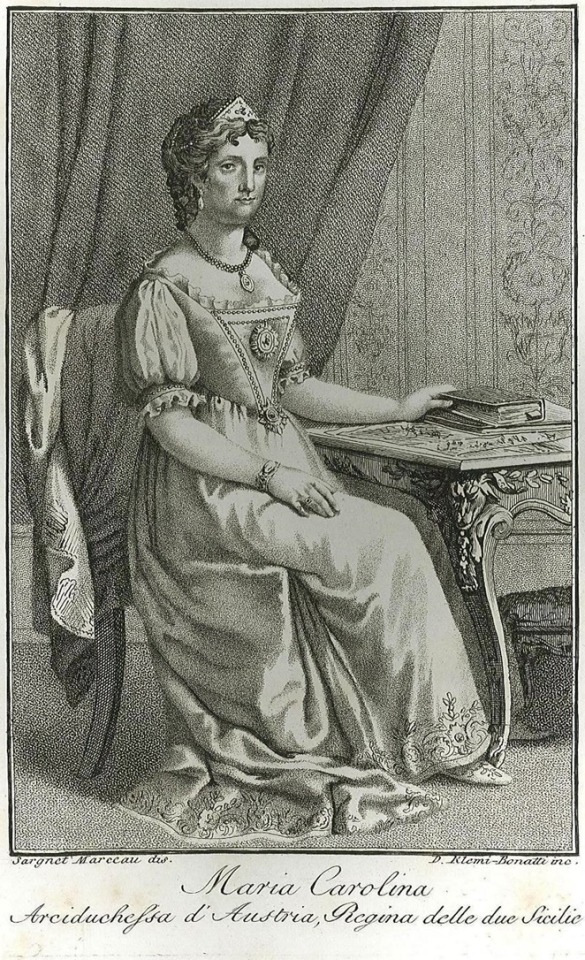
Maria Carolina of Austria, Queen of Naples and Sicily.
#maria carolina of austria#house of habsburg lorraine#austria#archduchess#house of bourbon two sicilies#long live the queue
12 notes
·
View notes
Note
Were they just honoring the exact same family members when they named Reichstadt and FJ or...Sophie gurl please.
JGJGHJSJK you know this idea actually crossed my mind, but basically yes, it just happened that the Habsburg's name pool was as big as their gene pool. But this actually is an interesting question, so let's take a super brief look at Habsburg naming!
As frustrating as it may be for us that everyone on this dynasty had the same three names, there was a logic behind it. Historian Barbara Stollberg-Rilinger in her fantastic biography of Empress Maria Theresia puts it best:
In the House of Habsburg, Christian names were always chosen from the same limited reservoir of saints, in ever varying order. The aim was not to stamp children as one-of-a-kind individuals but to mark dynastic identity and continuity.
While Stollber-Rilinger is specifically talking about the mid 18th century, some decades before the world turned upside down and many things changed forever, this naming convention kept being truth for the Habsburgs until the end of the dynasty. For example Franz Josef's son Rudolf was named after Rudolf I (1218-1291), the first king of the Romans from the House of Habsburg. The intention of marking Rudolf 's "dynastic identity and continuity" was clear. On top of that, it was also very usual to name a child after their godparent(s), who were often family members. It's not surprising, then, that most male members of the House of Habsburg in the 19th century were called a combination of Franz, Ferdinand, Karl, Josef, Ludwig, Otto or Leopold.
With that overview on Habsburg naming done, let's move on to the two cousins in question: Napoleon "Franz", Duke of Reichstadt and Franz Josef I.
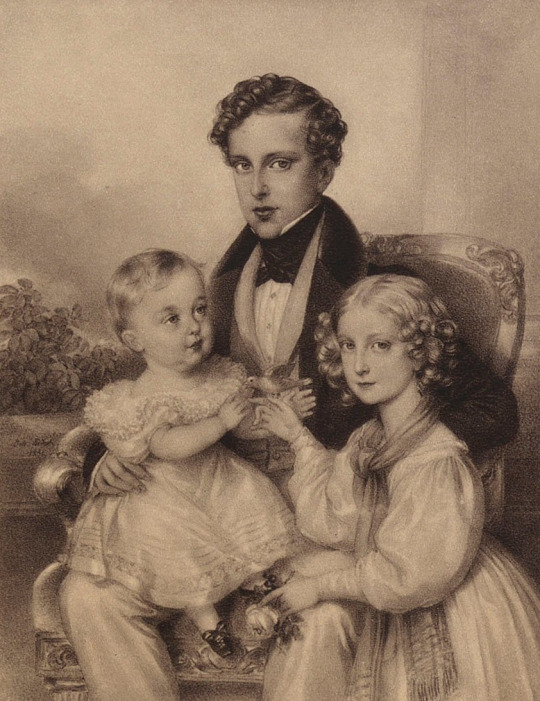
From left to right: Archduke Franz Josef, future Emperor of Austria; Napoleon II, Duke of Reichstadt; Princess Maria Carolina of Bourbon-Two Sicilies, future Duchess of Aumale.
As I said before, I don't know that much about Reichstadt other than the very basics, so I apologize beforehand if there is something wrong here, since I'm not in the loop of which are the best sources about him. In the same way, if there were any particular naming conventions in the House of Bonaparte, I'm not aware of them. That being said, let's look at the King of Rome's names!
Reichstadt's full name was Napoleon François Charles Joseph. Napoleon obviously after his father, a no brainer in my opinion: Little Napoleon's birth was basically a statement that the Bonaparte empire was here to stay. Then we have "François" whose German version would become in the name he would go by during his lifetime. This was after his godfather, his maternal grandfather Emperor Franz. "Charles" was in turn after his paternal grandfather Charles Bonaparte. Finally "Joseph" came from his second godfather, his uncle Joseph Bonaparte, King of Spain.
I find this naming very interesting, because Napoleon was creating a dynastic identity, rather than continuing it. And by throwing Emperor Franz's name in the mix, he joined the identity of his new dynasty with the Habsburgs.
Now let's look at FJ's name!
Sophie and Archduke Franz Karl's firstborn was named Franz Josef Karl. Were did these names came from was surprisingly harder to check than Reichstadt's names, because all the biographies in English that I checked on the Archive just straight up skip his baptism? I had to look for information about it in András Gerő's Hungarian biography of FJ using a machine translator. As I suspected, Emperor Franz was also the godfather of this grandson. In fact, old Franz full name was "Franz Josef Karl" so my guess is that all of FJ's names are after him.
At the time of his birth Franz Josef was several people behind the throne of Austria, yet given that there wasn't much hope in Crown Prince Ferdinand producing an heir, that he might one day succeed was not out of the realm of possibility; perhaps naming him exactly like his imperial grandfather was intentional. In any case, it followed the conventional naming rules of the House of Habsburg. By the way, the future Emperor of Austria was always just called "Franz" or "Franzi" amongst his family, he chose to ascend to the throne by the name of "Franz Josef" because he also wanted to be associated with Emperor Joseph II. Yet another example of Habsburg names marking "dynastic identity and continuity".
Now to finish the ask let's address the elephant in the room, the reason why are we looking at the names of these two cousins in particular instead of literally anyone else. Could Reichstadt had been, in fact, FJ's father?
Rumors about Reichstadt and Sophie being too friendly had in fact been going on even before Franz Josef was born. However, I think pretty much no one believes that him being the future emperor's father is possible. Let's look at what one of Reichstadt's biographers, Octave Aubry, has to say about this:
It has been asserted that Reichstadt was the father of Franz-Josef. The contention does not stand investigation. The friendship between the two lovers did not begin until after the birth of Sophie’s first child. As for her second, Maximilian, who was to be born in July, 1832, and to die in Mexico, such a filiation is not at all impossible. But in that direction everything is conjecture. If the two lovers themselves knew, they kept their secret. They loved each other: that is the only thing certain.
I've only read some fragments of this biography very superficially, but just by this you can tell that Aubry not only believes that an affair indeed happened, but also that he totally ships Reichstadt and Sophie lol. So if even him, who I believe is one of the main biographers to held the belief that they were more than close friends, doesn't buy into the rumors, then truly there isn't any evidence to back this up. About what I think about Max potentially being Reichstadt's son I already answer it in another ask.
Finally, I wanted to note that Reichstadt was very fond of his little cousin Franz Josef. He would often play with with him, and took him in his walks with Sophie. I found in Aubry's biography this very touching moment between them from when Reichstadt was already on the verge of death:
He asked to have little Franz-Josef brought to his room, for the lad’s charming ways delighted him. He stroked his hair repeatedly, and showed him little objects that he thought would amuse him and then finally held him in a tight embrace for a moment, dreaming. The child looked up at him, earnest, bored perhaps. His nurse came for him and his big cousin released him with a sigh.
I like to believe that Reichstadt was happy to share names with the cousin he loved so much.
#tl;dr: they were both named after emperor franz. i just ended up going down a ridiculously deep naming rabbit hole sorry#and now I legit feel like tearing up a bit dfgdfgk#also if you can't tell already my napoleonic subjects of interest are literally just napoleon's sons lol#napoleon ii duke of reichstadt#franz josef i of austria#franz i of austria#asks
33 notes
·
View notes
Text

Prince Christian of Denmark, Princess Maria Carolina of Bourbon Two Sicilies, Princess Maria Chiara od Bourbon Two Sicilies and friends attend the F1 Grand Prix of Monaco - Qualifying at Circuit de Monaco in Monaco -May 27th 2023.
#prince christian#danish royal family#denmark#princess maria carolina#princess maria chiara#bourbon two sicilies royal family#2023#may 2023#f1 grand prix of monaco 2023#f1 grand prix of monaco#royal children#my edit
16 notes
·
View notes
Text

Princess Maria-Carolina of Bourbon - Two Sicilies (left) || Alberta Ferretti
#Princess Maria Carolina of Bourbon Two Sicilies#Princess Maria Carolina#Alberta Ferretti#gown#turtleneck
3 notes
·
View notes
Photo
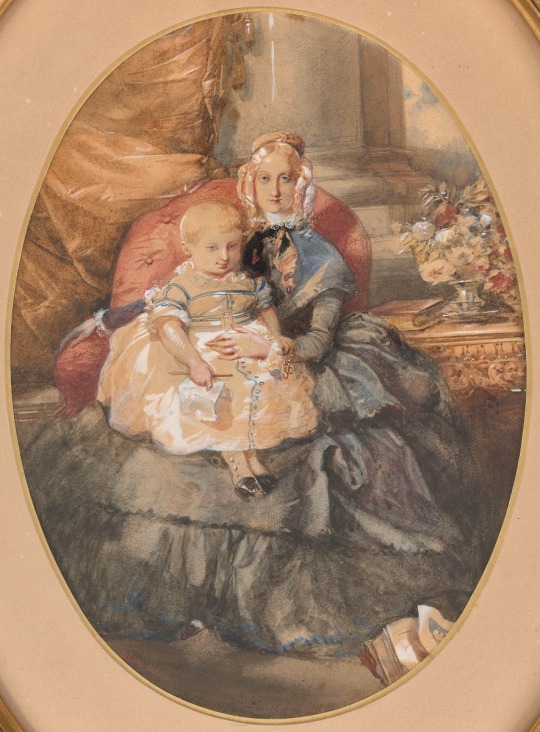
Maria Carolina, Duchess of Aumale, nee Princess of Bourbon-Two Sicilies, with her eldest son, Louis, Prince of Condé, in 1847.
#Princess Maria Carolina of Bourbon-Two Sicilies#Duchess Maria Carolina of Aumale#Duchess of Aumale#Princess of Orleans#Princesse d'Orleans#Princess of Bourbon-Two Sicilies#Orleans#Prince of Conde#Princess#Royalty#History
34 notes
·
View notes



